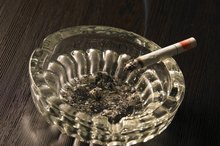Do Brussel Sprouts Cause Urine to Smell?
Brussels sprouts are a highly nutritious food included in the Brassica genus of vegetables. They contain vitamin A, folate, fiber, beta-carotene and a high concentration of vitamin C. Brussels sprouts and other vegetables of the Brassica genus, such as asparagus and cabbage, also contain a special chemical called methyl-mercaptan. This chemical produces a bitter smell in the urine.
About Methyl-Mercaptan
Methyl-mercaptan is a colorless gas released from the feces of animals. It is a natural chemical found in the blood, brain and tissue matter of humans and animals alike. The gas is also released from animal decay in swamp areas and can be found in several types of natural gases, coal, tar and various crude oils. It is used in manufacturing to produce pesticides, plastics and even chicken feed.
- Methyl-mercaptan is a colorless gas released from the feces of animals.
Chemical Reaction of Methyl-Mercaptan
Health Problems Related to Natural Gas Leaks
Learn More
Not a lot is known about the chemical reactions that occur in the body when consuming methyl-mercaptan. Scientists have researched the natural chemical for a number of years, and have reached a few conclusions. For example, we know that methyl-mercaptan leaves the body quickly after digestion. Studies in lab rats at the Agency for Toxic Substances and Disease Registry in the 1990s have indicated that once the chemical enters the blood stream, it is difficult to break down in the body and is either exhaled from the lungs as you breathe, or passes through the urine within a few hours 1. The toxin from the escaping methyl-mercaptan is the odor you smell when you urinate.
- Not a lot is known about the chemical reactions that occur in the body when consuming methyl-mercaptan.
What Happens When You Eat Brussel Sprouts
During the consumption of Brussels sprouts, glucosinolates, which are nutrients that aid the body's detoxification system, break down into sulforaphane, which triggers natural enzymes in the liver to help eliminate toxins from the body. Scientists also believe that these glucosinolates interact with glutathione, a natural antioxidant found in the cells of all known life. It is this antioxidant that is thought to prevent cancer. Because sulforaphane is an organic compound that contains sulfur, it could also explain why scientists at the Agency for Toxic Substances and Disease Registry have detected amounts of sulfur in both the urine and breath of lab rats when given a dose of methyl-mercaptan 1. However, even though organosulfur compounds are often associated with a foul odor, it is unclear if the sulfur content of the urine caused the smell.
- During the consumption of Brussels sprouts, glucosinolates, which are nutrients that aid the body's detoxification system, break down into sulforaphane, which triggers natural enzymes in the liver to help eliminate toxins from the body.
- Because sulforaphane is an organic compound that contains sulfur, it could also explain why scientists at the Agency for Toxic Substances and Disease Registry have detected amounts of sulfur in both the urine and breath of lab rats when given a dose of methyl-mercaptan 1.
Healthy Despite the Odor
List of All Chemicals in Cigarette Smoke
Learn More
A healthy diet that includes vegetables from the Brassica genus is desirable, and the advantages of overall better health with an improvement in body detoxification and a possible solution to fighting some of the most damaging cancers clearly outweighs a little embarrassment and some disconcerting odors. A good dietary choice is to eat these vegetables raw or cooked a few times a month. A study from the Roswell Park Cancer Institute recently proved that three servings of raw cruciferous vegetables per month protected against bladder cancer 3.
Related Articles
References
- Agency for Toxic Substances and Disease Registry: Toxicological Profile For Methyl Mercaptan
- Natural News: Sulforaphane From Broccoli and Cruciferous Vegetables Selectively Destroys Cancer Cells
- Cancer Epidemiology, Biomarkers & Prevention: Consumption of Raw Cruciferous Vegetables is Inversely Associated with Bladder Cancer Risk
Writer Bio
Paula Bogas co-owns a research, writing and editing company. She has written countless grants, business plans, books, reports, ebooks and other documents. Bogas has coauthored five books and published a novel. She has been a writer for more than 25 years and holds a Master of Library Information Sciences.







